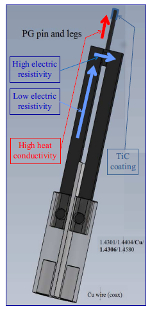EPJD Topical review - Plasma potential probes for hot plasmas
- Details
- Published on 22 May 2019

Plasma probes are well-established diagnostic tools, being relatively simple to construct and easy to handle. The most easily accessible parameter is the floating potential, but the floating potential of a cold probe is not very significant; much more important and relevant is the plasma potential. However, in most types of plasmas, consisting mainly of electrons and only positive ions, the higher mobility of the electrons means that the floating potential is more negative than the plasma potential by a factor proportional to the electron temperature.
In a new Topical Review in EPJD co-authored by teams from Austria, Slovenia, Denmark and Italy, the authors present a review of probes whose floating potential is close or ideally equal to the plasma potential. Such probes are known as Plasma Potential Probes (PPP), and they can either be Electron Emissive Probes (EEPs) or so-called Electron Screening Probes (ESPs). These probes make it possible to measure the plasma potential directly and thus with high temporal resolution.
The article discusses EEPs (in which the plasma electron current is compensated by an electron emission current from the probe into the plasma) and ESPs, in principle operable only in strong magnetic fields, in which most of the plasma electron current is screened off from the probe collector. The authors present details of strong and robust EEPs and two types of ESPs, called Bunker Probes (BUP), for the use in the Scrape-Off Layer (SOL) of Medium-Size Tokamaks (MST), and other types of strongly magnetized hot plasmas.
Codrina Ionita, Bernd Sebastian Schneider, Stefan Costea, Ovidiu Vasilovici, Jernej Kovačič, Tomaz Gyergyek, Volker Naulin, Jens Juul Rasmussen, Nicola Vianello, Monica Spolaore, Ronald Stärz, and Roman Schrittwieser (2019), Plasma potential probes for hot plasmas,
European Physical Journal D 73:73, DOI: 10.1140/epjd/e2019-90514-5




